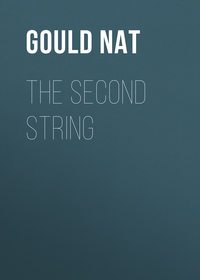 полная версия
полная версияFast as the Wind: A Novel
"No, he's not at all well, Dick. He's consumptive, I'm sorry to say."
"Have you a jockey?"
"Not at present."
"Will you give me the mount?"
"Are you not engaged to ride Ripon?" asked Picton, surprised.
"No, there is no engagement, and I have fallen out with Mr. Hansom about the riding of his horse in the St. Leger," said Banks.
"You are free to ride my mare?" asked Picton.
"Yes."
"Then you shall have the mount. I would sooner see you on her than any one, except Fred," said Picton.
"Thank you, sir," said Banks, jubilant, and went off to tell Rupert Hansom, who said it was an infernal shame, and raved about it to his friends, calling Banks all sorts of names.
"I don't see what you have to complain of," said Mrs. Elroy. "You said he rode a bad race in the St. Leger, jeeringly asked him if he'd like the mount on Tearaway in the Cup, when he replied he would. It appears he took you at your word and accepted the mount when it was offered him; I think he's on the winner."
"Do you indeed?" he said crossly. "I hope if you back her you'll lose your money."
"How very disagreeable you are," she said. "Men with diminutive minds always appear to lose control over their tempers, and forget their manners."
Rupert Hansom found another jockey in Crosby, a very fair rider.
There were seven runners for the Cup, fields had been stronger than usual at the meeting.
Rita looked supremely happy. She knew what was coming; Picton had more than hinted at it. Before she left Haverton he would ask her to be his wife; she knew what her answer would be. She loved him, had done so from the first time they met, and she was quite sure he loved her.
Dick Langford also guessed what was about to happen; it pleased him to contemplate Picton as a brother-in-law.
"I'll give him The Rascal as a wedding present," he said to himself, laughing.
Before they went to the races on Friday he said to Rita: "Picton's having a great week – the Leger, the Cup to-day, a wife before the week's out."
She laughed as she replied: "That's a treble – better than his double on The Rascal."
"You're worth the winning, Rita," he said kindly. "Wonder what I shall do without you."
"Find a wife," she said.
"Expect it will be compulsory; it is not good for a man to live alone," he answered.
A tremendous crowd witnessed the Doncaster Cup. It was as memorable a race as the St. Leger; many thought it more so.
Sir Robert secured the services of May, a reliable jockey, at times brilliant.
"I hope I shall beat you," he said to Picton.
"I hope Tearaway will win," was the laughing reply.
"It will be a great race," said Dick; "but my bit goes on the mare."
"And mine," said Rita.
"And mine," said Hector.
"All against me," laughed Sir Robert. "My hundred or two goes on Tristram."
"Robert, I don't think you ought to bet. Remember the trial," said his wife.
"You against me!" he exclaimed. "I am in a terrible plight indeed."
The horses were out, seven in number, a real good lot.
Sir Robert's face glowed with pride as he heard the roar of cheers which greeted the red jacket and black cap, and his good horse Tristram. Another roar was given for Tearaway; the others were all cheered lustily. They were soon on their journey, Sir Charles making the running, followed by Fair Dame, Bronze, and Harriet, with Ripon, and Tearaway next, and Tristram last. Sir Robert's horse never went to the front in the earlier stages of a race.
Rupert Hansom gave Crosby instructions to keep in touch with Tristram and Tearaway.
"You've nothing else to fear," he said; "and remember there's a hundred for you if you win."
Sir Charles soon dropped out of it and Harriet took his place. At the back of the close the lot closed up, half a dozen lengths separated first and last.
In the straight they swept; then a change took place. Ripon made the first move forward, followed by Tearaway and Tristram.
Up the straight they came at a terrific pace, for Tearaway had gone to the front, and Banks was making every use of her great speed and staying powers.
Cheer after cheer pealed over the course when the saffron jacket was seen in the lead; the filly was favorite, a six to four chance.
Banks kept pushing her along; he did not know how to handle her as well as Fred Erickson, but did his best.
May was riding Tristram strictly to orders.
"Bring him with a rush in the last quarter of a mile," said Sir Robert.
Ripon was going well, but could not keep the pace with Tearaway.
At last May brought Tristram out and the great horse came along with giant strides, his natural style of going. On he came swooping down, passing first one then another, drawing level with Ripon, leaving him, and going in pursuit of Tearaway.
The excitement was intense; all eyes were fixed on the splendid pair, the mare and the horse, owned by two good sportsmen, hailing from Yorkshire, both well known in the county. Captain Ben Bruce was with Brack, who had been persuaded to stop until the meeting was over; he was very fond of the old boatman, and knew he deserved well of them all. Brack was to have a look round Haverton before he returned home. He had backed Tearaway again, and was shouting her name frantically, much to the Captain's amusement. She looked like a winner, she was going so well, but there was no mistaking the way in which Tristram galloped.
"He's catching her!" said Sir Robert excitedly.
Picton smiled confidently; he did not think he would do it.
A great shout went up when Tristram got to Tearaway's girth; May rode a brilliant finish.
Banks handled the filly well, but had not the same powers as Fred Erickson at his best; they were wanted now just to help her home.
Neck and neck they raced, head and head, not an inch between them, outstretched nostrils; it was a tremendous race, one of the best ever seen for the Cup.
Sir Robert and Picton looked on, thrilling with excitement. It was a desperate finish. Both were game, the filly and the horse, and fought to the bitter end. As they passed the judge's box no one could tell which had won.
"Dead heat," said the judge.
Sir Robert and Picton shook hands heartily.
"By jove, what a race!" the baronet said.
"I'm glad it was a dead heat," said Picton. "We've both won."
CHAPTER XXVII
THE RESERVED COMPARTMENT
LENISE ELROY arrived at the station and looked around for Mr. Rolfe. He was not there; at least she did not see him. As the time drew near for the departure of the train she became anxious; she hoped much from this railway journey in a reserved compartment: they would be able to talk without interruption.
Hector had seen Brack, who explained how Mrs. Elroy had questioned him at Torquay, and also Carl Hackler.
"You'd best be careful," said Brack; "I saw you talking with her on the course."
"She has no idea who I am. I thank you all the same," he answered.
"Mr. Woodridge has given me a hundred pounds and a new boat," said Brack.
"And you richly deserve it! Here's a twenty-pound note to add to it," said Hector.
"I'll be a rich man before I get back to Torquay," said Brack.
"Here you are; I thought you were not coming," said Mrs. Elroy, as Hector came up.
"There's plenty of time," he said; "ten minutes."
"You can't think how anxious I felt."
"Why? You could have gone on alone."
"That would not have suited me; I want your company," she said.
They were shown to a reserved compartment, the guard locking the door until the train started; it was crowded, and some of the race-goers are not particular where they get in.
"It's a non-stop train; we are alone until we arrive at King's Cross," said Hector.
Lenise was at her best. She confessed she was really in love this time; she meant to find out how matters stood with him.
Despite all she had done, he felt her charm still. She was not a good woman, far from it, but there was something so subtle and attractive about her he found it hard to resist the spell.
The thought of Sir Robert's words, "I wish the Admiral could have seen this," gave him courage. It had to be done – why not do it now? There was no escape for her; it was not a corridor train; they were boxed up for three hours or more. She looked at him with softly gleaming eyes; her whole being thrilled toward him; she had never been so fascinating.
"You are quiet. What are you thinking about?" she said. "Reckoning up your winnings on Tearaway, I suppose."
"My thoughts were far away from there," he said.
"Where were they wandering?"
"I was thinking about you," he said.
"How nice of you," she said quietly.
"You prefer me to Fletcher Denyer?"
"How can you ask such an absurd question?"
"I was wondering whether I loved you; I was thinking whether you would be my wife, if I had the courage to ask you."
"Try," she said, her eyes on him.
"Do you really love me?" he asked.
"You know I do; you must have known it from the first time we met."
"There should be no secrets between us," he said. "I have something to tell you."
She turned pale, a faint shiver passed through her; he noticed it. Would she confess what she had done?
"I too have a confession to make, if you love me, and wish me to be your wife."
"Otherwise?"
"I shall keep my counsel; it would not interest you."
"Let me tell you something first," he said.
"As you please, confidence for confidence," she said with a faint smile.
"I have not always lived a decent life," he said. "I once committed a crime, I paid the penalty, I was sent to prison, to Dartmoor."
She started again, a look of fear was in her eyes.
"When I told you I was mining on Dartmoor it was not true; I worked on Dartmoor, but it was as a prisoner. I was in the same gang as Mr. Woodridge's brother."
"You were," she said in a hollow voice, wondering why he told her this.
"Yes, poor fellow. I never saw a man so broken down in my life; his face haunted me. I said something about it before, you may remember."
"Yes, I recollect," she said.
"We had very little chance of speaking but I heard his story in fragments, how he hated the woman who had brought him down so low. He swore to me he did not kill the woman's husband, but he would not tell me who did, although I asked him many times. From what I heard I came to the conclusion she fired the shot."
His eyes were on her; she could not face their searching glance.
She made no remark, and he went on: "It was mainly through me he escaped," he said. "When I was released I searched out his brother and made a suggestion. Mr. Woodridge has no idea I was in prison; he thought I had been abroad for several years. Needless to say, I did not enlighten him; I will trust you not to do so."
"I shall never speak of it."
"Does this alter your opinion of me? Shall I go on?" he asked.
"I love you," she said. "I shall always love you, no matter what happens."
"As you know, Hector Woodridge escaped."
"But he is dead."
"That is uncertain. He may be, or he may have got away and be in hiding. He must be greatly changed, no one would recognize him," he said.
"It is hardly possible," she said.
"Perhaps not, but still he may be alive, and if he is, the woman who ruined him had better beware. I believe he would kill her if he met her. What have you to confess to me? You see I have placed my character in your hands; you can ruin me socially if you wish."
"I do not wish, and I thank you for the trust you have placed in me," she said. "I am afraid to confess all to you, afraid you will never speak to me again when you know who I am."
"Who you are?" he exclaimed.
"I told you, when you remarked on the curious coincidence that my name was Mrs. Elroy, that I was not the Mrs. Elroy connected with Hector Woodridge's case."
"Well," he said.
"I told you a lie. I am the same Mrs. Elroy. It was my husband Hector Woodridge shot. It was me he was in love with."
He looked at her without speaking for several minutes. The silence was painful; he was thinking how to launch his thunderbolt, how best to trap and overwhelm her. There was no escape, she was entirely at his mercy.
"You ruined Hector Woodridge, sent him to penal servitude for life," he said.
"I was not entirely to blame. We loved, or at least we thought so."
"How did it happen?" he asked.
"The shooting?"
"Yes."
"It was quite unpremeditated; had the revolver not been there it would never have happened. I believe my husband intended to shoot him, and me – it was his revolver."
Hector wondered if this were true.
"The revolver was on a small table. I saw it but did not remove it; had I done so the tragedy would not have happened."
"Why did you leave it there?" he asked.
"I do not know; probably because I did not wish my husband to know I was afraid. I was aware he had found us out, that an exposure must come sooner or later. He was madly in love with me; I almost hated him, he was so weak, almost childish, and I wanted a strong man to rule me. Shall I go on, do you despise me, look upon me as a very wicked woman?" she asked in a strained voice.
"Go on," he said; "tell me the whole story, how he was shot, everything."
"I will, I will make a full confession; but be merciful in your judgment, remember I am doing this because I love you, that I do not want it to stand between us, I plead to you not to throw all the blame on me. Hector Woodridge was a strong man and I loved him, I believe he loved me, he overcame all my scruples. I yielded to him, gave myself to him – surely that was a great sacrifice, my name, honor, everything for his sake. We were together in my husband's study. We thought he was in London, but he did not go; he set a trap and caught us. I shall never forget the look on his face when he came into the room. I saw his eyes rest on the revolver, and I felt it was our lives or his, but we stood between him and the weapon.
"Hector Woodridge guessed what was in his mind; he must have done so, for he laid his hand on the revolver. My husband saw the movement and said, 'Put that down, you scoundrel,' and advanced toward us. Hector raised the revolver and told him to stand back. He did so; he was afraid.
"There was an angry altercation. I remember saying I was tired of him, that I would live with him no longer, that I loved Hector Woodridge. This drove him to distraction; he became furious, dangerous; he would have killed us without hesitation had he possessed the revolver, there was such a murderous look in his eyes. Does my sordid story interest you?" she asked.
"It does; everything you do or say interests me," he said.
"And you do not utterly despise me, think me too bad to be in decent society, to be sitting here alone with you?"
"Go on," he said in a tone that was half a command, and which caused her to feel afraid of something unknown.
"At last Elroy's rage got the better of his prudence; he made a dash forward to seize the revolver, raised in Hector's hand. It was the work of a second, his finger was on the trigger; he pulled it, there was a report, Elroy staggered forward, fell on his face, dead," she said with a blanched face, and trembling voice.
"You pulled the trigger," he said, calmly looking straight at her.
CHAPTER XXVIII
HOW HECTOR HAD HIS REVENGE
THIS direct charge so astonished her that for a few moments she did not recognize its full significance. She sat wildly staring at him, completely overwhelmed.
He watched; her terror fascinated him, he could not take his eyes off her.
She tried to speak and failed, seemed on the point of fainting. He let down the window; the cool air revived her, but she was in a deplorably nervous condition.
At last the words came.
"I pulled the trigger?" she said. "What do you mean, how can you possibly know what happened?"
"I said you pulled the trigger. It is true, is it not?"
"No; Hector Woodridge shot my husband," she said in a low voice. She was afraid of him; his knowledge seemed uncanny – or was it merely guesswork?
"That is a lie," he said.
"How dare you say that!" she said, her courage momentarily flashing out.
He smiled.
"I thought this was to be a full confession," he said.
"I will say no more; you do not believe me," she said.
"Then I will continue it," he said, and she seemed petrified with fright. He gave her no chance. He related the history of the trial; so minute were his particulars that she wondered if he were a man, or a being possessed of unearthly knowledge.
"Hector Woodridge was condemned to be hanged, and you spoke no word to save him. Your evidence damned him, almost hanged him, sent him to a living tomb."
"I could not lie; I had sworn to speak the truth," she faltered.
"You did not speak the truth," he almost shouted; and she shrank back, cowering on her seat. She wondered if he had suddenly gone mad. Impossible. His knowledge was uncanny.
"Had you spoken the truth you would have saved him; but you dared not. Had you told all he would have been set free, you would have been sentenced. You were too much of a coward to speak, fearing the consequences; but he, what did he do? He remained silent, when he might have saved himself and proved you guilty."
"It is not true," she murmured faintly.
"It is true," he said fiercely. "Think what he has suffered, think and tremble when you imagine his revenue. I will tell you something more. You were in Torquay when he escaped. You were at supper one night; there was a chink in the blind; footsore, hunted, his hands torn by the hound, his body all bruised and battered, hungry, thirsty, every man's hand against him. Hector Woodridge looked through it, he saw you feasting with your friends."
"Stop!" she cried in an agonized voice. "Stop! I can bear no more. I saw his face, I have never had a peaceful moment since."
"I shall not stop," he said harshly. "Outside he cursed you, prayed for justice, and another chance in life."
"How do you know all this?" she asked in a voice trembling with dread.
"Never mind how I know; sufficient that I know," he said. "Hector Woodridge, thanks to an old boatman, escaped and boarded the Sea-mew, his brother's yacht, lying in Torbay."
Her agitation was painful, her face became drawn and haggard, she looked an old woman. Rising from her seat, she placed her hands on his shoulders, looking long and searchingly into his face.
"Sit down," he said sternly, and she obeyed.
"He was taken away on the Sea-mew. He went mad, was insane for some time, then he fell dangerously ill; when he recovered he was so changed that even the servants at Haverton, who had known him all his life, failed to recognize him."
"He went to Haverton?" she said.
"Yes; he is alive and well. No one recognizes him as Hector Woodridge; he has assumed another name and once more taken a place in the world. To all who knew him he is dead, with two or three exceptions. The prison authorities think he is dead; they have given up the search for him. He is safe, able to carry out his scheme of revenge against the woman who so cruelly wronged him. You are that woman, Lenise Elroy."
"And what does he purpose doing with me?" she asked faintly. "You cannot know that."
"I do; I am his most intimate friend."
She started; a weird, unearthly look came into her face.
"His one object in life is to prove his innocence. He cannot do that unless you confess," he said.
"Confess!" she laughed mockingly. "There is nothing to confess."
"You know better, and you will be forced to confess or else – "
"What?"
"If you do not prove his innocence he will – "
"Kill me?"
"That may happen, under certain circumstances, but he wishes to give you a chance."
"He has asked you to speak to me?"
"Yes; he was at Doncaster."
"At the races?"
"He saw you there. Something of the old fascination you exercise over him came back, and for a moment he wavered in his desire for revenge."
He saw a faint smile steal over her face.
"He told you this?"
"Yes, and more; but I have said enough."
"You have indeed. You have brought a terrible indictment against me, Mr. Rolfe; if it were true I ought to die of shame and remorse, but it is not true, not all of it," she said.
"Lenise, look at me. Do you love me after all I have said?"
"I do. Nothing you can say or do will ever alter that."
"And you will marry me?" he asked. "It is a strange wooing."
"I will be your wife. You will save me from him; you will try and persuade him I am not deserving of a terrible revenge," she said.
"Are you afraid of him – of – Hector Woodridge?"
She shuddered.
"Yes," she said, "I am."
"Supposing he were here, in this carriage in my place?"
"I should fling myself out," she said. "I should be afraid of him; it would be terrible, awful. I could not bear it."
"Because you know you have wronged him. Do the right thing, Lenise. Confess, prove his innocence, think how he has suffered for your sake, how he has kept silent all these years," he said.
"Why do you torture me? If he has suffered, so have I. Do you think the knowledge of his awful position has not made me shudder every time I thought of it? I have pictured him there and wished I could obtain his release."
"You can prove his innocence," he said.
"Supposing I could, what then? What would happen? I should have to take his place."
"And you dare not."
"I am a woman."
"Then you will not help to prove his innocence?"
"I cannot."
Hector got up quickly, took her by the wrists and dragged her up.
"Look at me, Lenise. Look well. Do you not know me?"
He felt her trembling; she marked every feature of his face. Gradually it all came back to her, overwhelmed her. She traced feature by feature – the eyes were his eyes, yes, the face was his face. He saw the dawn of recognition come over her and break into full light. She knew him; her eyes dilated with terror, her cheeks went ashen pale, her lips were colorless, her limbs trembled, she could hardly stand.
"Yes," he said. "It is I, Lenise, Hector Woodridge, and you are alone with me in this carriage."
"Mercy, Hector, mercy, I am only a woman."
"And you love me, you said so, you love William Rolfe?"
She sank on her knees, she clasped his limbs, looking piteously into his face. He saw how she suffered.
"Get up," he said; "do not kneel there."
She hid her face between her arms, he heard her sobs, saw they shook her frame. The train rattled on, whirling at a great pace, drawing nearer and nearer to London. She moaned, it cut him to the heart to hear her. A fierce struggle went on within him, a battle with his strong will. He placed in the front rank the memory of all he had suffered, then brought up his father's death, the cruel disgrace, as a reserve to support it. He had his enemy beaten at his feet, he was victor, it was a humiliating defeat for her.
"The quality of mercy is not strained."
Strange how the line should come into his mind at this moment. He had always been a student of Shakespeare, he knew much of it by heart, in prison he repeated whole parts, and it solaced him.
"Lenise, get up."
His tone had changed, she raised her tear-stained face. What she saw in his look made her cry out:
"Hector, is it possible? Speak to me, Hector! I know you now. Oh, what a fool I have been! I have always loved you, but I was a coward. It was you, not William Rolfe, I loved again when we met. You were Hector Woodridge and my soul went out to you. Do with me as you will. I am strong now, for I believe you love me. I will confess, make it public, tell everything. You know I did it. The revolver was in your hand, your finger on the trigger, I pulled your hand and it went off. I will make it known if only you will forgive me. God, what a fiend I have been to let you suffer so! And you have kept silence all these years for my sake!"
She spoke rapidly; he knew she was in earnest and his heart softened. He had loved her deeply, he loved her now, he had always loved her, even in his bitterest moments in prison, when he had framed a terrible revenge. It had been his intention to marry her in his assumed name, and on their wedding night tell her he was Hector Woodridge and then – well he shuddered at the mere thought of how near a brute he had been.





